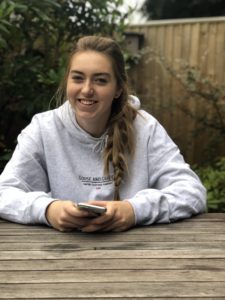Content warning: this article contains references to suicide.
I’ve debated with myself whether it was the right time and place to share this with the world. But my thoughts were, if I can just help just one person with my story then it is 100% worth it and the right decision.

I have never spoken about my mental health really to anyone. I think the reason for that was because I was embarrassed and ashamed of the way I was feeling. In reality, the sooner I could accept it, the sooner I would be able to feel better. This will probably come as a bit of a shock to many, including my close friends and family. I was able to hide it well when I was in public, constantly smiling and cracking jokes. It was almost like I was leading a double life, being able to trick my brain into thinking I was someone else when outside of my bedroom. But as soon as the door to my room closed, I would just cry, and cry, and cry – until I was so exhausted, I would crash on my bed and fall asleep.
I’ve done this journey on my own, even up until now as I’m writing this. Some people may say that’s silly, but it was the way I was feeling at the time. I didn’t want to drag anyone into my misery with me. I think I would have liked some help at times, but it just never came about and I’m not angry or sad about that – it was just the way it happened. I’m glad it happened the way it did because I’m a better person because of it today, and I’m so proud of myself. I still haven’t spoken in detail to anyone about that night. I didn’t feel comfortable speaking about it until now.
Especially in times like this, living through the pandemic, it is more important than ever to check up on mental health. Even before the pandemic, there were over 6000 deaths by suicide per year in the UK and an estimated 800,000 worldwide. So, I can only dread what the impact of lockdown has done to those numbers. So, pause reading this, and go and send your friend a message; see how they’re feeling, what have they done that day etc.

No one has asked me to write this, but it is something I have thought about for a very long time now, and it is sharing the story of my mental health battle, which is still something that affects me to this day, emotionally. I am writing this on the 10th of April, 2021 and my attempt to jump off a bridge was the 20th of November, 2019. I was 17 at the time and it was in Lightwater, Surrey, the area I’m from. The night before was a Tuesday night and I had written an apology letter to my friends and family. I remember being extremely sad and alone that night; the next day was even sadder, and I had this restless energy inside me.
I do not see suicide as the act, the death, or the fall from a height. I see it as a long illness, an illness with origins in trauma and isolation, violence, and neglect, in the loss of home and belonging. It is a disease of the body and the brain – and if you make that distinction, a disease that kills over time.

I was stood on the edge of the bridge. I kept a slight hold of the barrier behind me. The sun had almost disappeared; the air was cold. I was wearing my favourite jumper, a red New Jersey sweatshirt. I gazed down at the concrete motorway and the occasional car that whizzed by beneath me.
It was less dizzying to look down than up. Clouds crossed the sky. It was getting darker, and I could hear more traffic on the road below, people driving home from London after work. I was cold; I’d been up there a long time. I didn’t know that it had been two hours. It could have been any amount of time. I had on jeans, a sweatshirt, and shoes. My hands and clothes were dirty from the railing. I shoved my hands into my pockets and squeezed my arms against my sides, trying to get warm.
I imagined my body on the ground. It was something that I could picture. But the fall, how long would that last? I clutched the railing, then let go a little, then grabbed hold, then let go again, but caught myself.
I was not on the bridge to jump. I was not there to kill myself. I was there to die but death was not the plan. I was not making decisions. I was – looking back now – in acceptance. I did not want to die, only felt that I should. If you have had this illness, then you’ve had your reasons; and maybe you’ve believed, as I did, that it would be better for others, for all the people who have made the mistake of loving you, or who one day might if you were gone.
I peered up to the clouds and saw a plane glide past. It was hard to look at the sky. I couldn’t hold my head up. The last of the light hurt my eyes. I couldn’t stand straight, pull my shoulders back, or take a deep breath. I could see the motorway pull far back, it seemed to go on forever.
Suddenly I had an overwhelming feeling and voices shouting: “You’ve got so much to live for, promise me you won’t”. Immediately I snapped my head around, afraid someone had seen me on the ledge of a bridge. But there was no one there.
Something then clicked in my head and I can’t explain or describe it, it just happened. I remember climbing back over the railing. My clothes were filthy, and my hands were black. I held the bannister. I wasn’t going to die that day. I walked along the path to my car. Clicked the key, which was in my back pocket and sat in the driver’s seat. I remember looking in the rear-view mirror. Dark circles showed around my eyes. I put on the seatbelt and cranked up the heating and burst into tears. I must have been crying for a good thirty minutes before I got an alert on my phone reminding me of what class I had in the morning.
The drive back was terrifying, I sat there in silence, no music, occasionally hearing the click of the indicator or the rev of the clutch. When I got home, I turned the key in the lock as quietly as I could, hoping that everyone was in bed so I could run straight up the stairs to my room. The stars were in alignment for me that night, as they were, I went straight upstairs, shut my door, and fell asleep.
The next morning, I awoke a different person. All I could think about were the voices telling me that I was going to make it, that I had so much to live for and that there was so much more to life that I hadn’t experienced. I became more grateful for everything and everybody in my life and started to see the good in things again.
Months later I met my best friend at work, we bonded over our love of travel, work gossip and love for life. It didn’t take me long after meeting her to make a positive change in my life. She was there for me, providing a shoulder to lean on and bought me coffees so I could start to untangle and make better sense of what was going on in my head.
Without sounding trite, time is a great healer. It also provides an opportunity to reflect upon what is important – my friendship is somewhere near the top of that list. Although she wasn’t the only friend to provide support during my time of need, her interventions were instrumental in dragging me out of the gutter. Our friendship is not something I take for granted, and I will be forever in her debt and grateful for the open, loving, and non-judgmental relationship that has evolved over the past year.
Today, I have never been happier. I started university and despite being locked down due to Covid-19 I can count the bad days that I’ve had on my fingers in the past six months. A massive decrease to what it used to be and the fact that I got a second chance to try to live out my dreams means the world to me, and it’s the one thing I’m glad I failed at.
All of the negative feelings I had almost robbed me of a life worth living. Now I want to take the time I have and use it wisely, to make up for lost time and focus on bettering myself and others’ lives. I care more now than ever, and it’s because I know what it was like to not give anything at all.
Thank you.
If you have been affected by issues raised in this article, you can contact the organisations below for advice and support. Remember, you are not alone.
- The Samaritans: 116 123
- Mind 0300 123 3393
- RETHINK 0300 5000 927
Emily Herbert
Featured image via Emily Herbert.


1 Comment